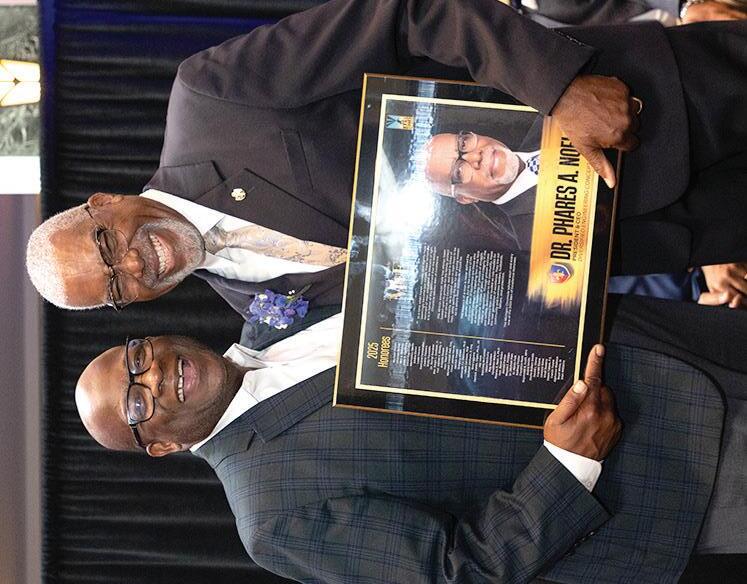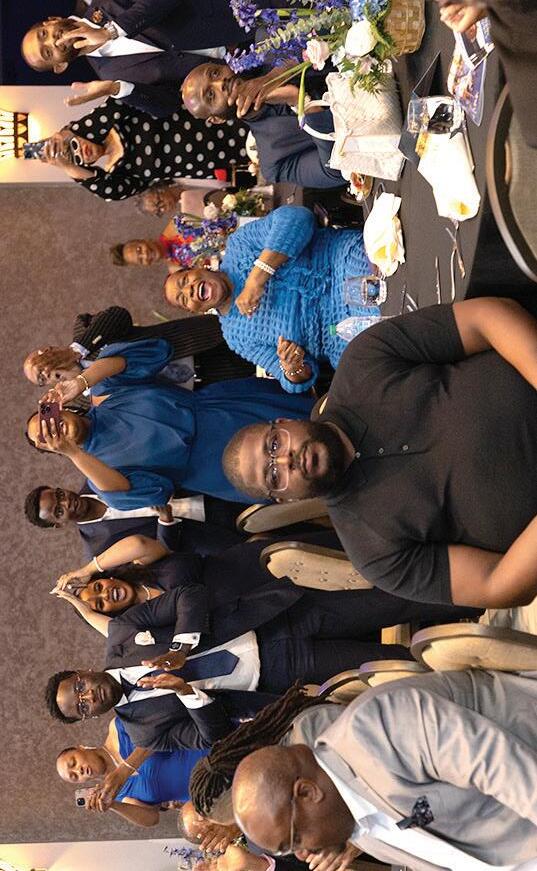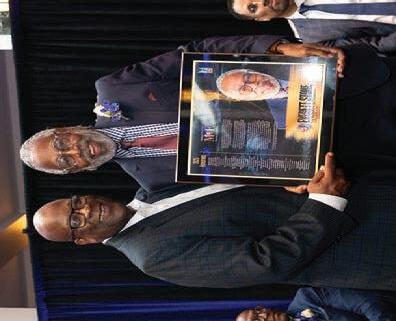




By Ebony JJ Curry SENIOR REPORTER
By Sam Robinson SENIOR REPORTER
Let
Some UAW members created a stir within their union Monday when Detroit City Council president and mayoral candidate Mary Sheffield posted a flyer inviting UAW members to a Detroit union hall to support her campaign.
The flyer featured the union’s pinwheel logo and the address to the UAW’s Local 7 on Connor Street.
By Ebony JJ Curry SENIOR REPORTER
However, the UAW and its leaders already endorsed Sheffield’s opponent, Triumph Church pastor Rev. Solomon Kinloch Jr.
Late Thursday night, Sept. 14, a historic moment unfolded in American labor relations as the United Auto Workers (UAW) union initiated a strike against Ford, General Motors (GM), and Stellantis. For the first time, the union took simultaneous action against all three major Detroit-based automakers. The action involves approximately 13,000 UAW members in assembly plants across Michigan, Ohio, and Missouri, who walked off their jobs after existing labor contracts expired at 11:59 p.m.
IUAW president Shawn Fain rallied with Region 1 and Region 1A leadership last month at the UAW’s Solidarity House on Jefferson, telling the crowd the union would put boots on the ground to support Kinloch’s campaign.
n a breathtaking celebration of talent, determination, and the unyielding spirit of Black excellence, the Michigan Chronicle marked its 10th Annual 40 Under 40 event Thursday evening. This year’s soirée, drenched in the theme “All Black Everything with Gold Accents,” transcended expectations and essential ly illuminated the golden gems within the true essence of Black excellence. Hosted by the charismatic duo of Andre Ash and Lynzee Mychael from Michigan Chroni cle’s Finally Friday, the night was a triumph for the city of Detroit and its vibrant community of young Black professionals.
Sheffield’s campaign declined to comment on the creation of the flyer, referring Michigan Chronicle to one of the members behind the effort to support Sheffield. Lynda Jackson of UAW Local 7 said members created the flyer, not the campaign. She said she was emailed by a senior UAW leader instructing them to remove the logo and move the event.


By Michigan Chronicle Editorial Board
never knew it would be Detroit’s brand name business, so I take a lot of pride in the fact that our business represents our city’s pride.”
DPD Chief James White Says Increased Police Presence Culled Violence
The flyer, shared to Sheffield’s Instagram story, was deleted shortly after Michigan Chronicle reached out to her campaign.
The union members supporting Sheffield will hold the event at her campaign headquarters, Jackson said.
Shortly before midnight on Sept. 14, GM released a statement expressing disappointment with the strike action, despite offering what it termed an “unprecedented economic package” that included historic wage increases. Stellantis also expressed disappointment in a statement, saying the company immediately went into contingency mode to protect its operations.
The evening sparkled with a golden promise as we celebrated remarkable individuals from various walks of life. Among the honorees were the brilliant and visionary co-founders of Detroit Hives, Nicole Lindsey and Timothy Paul Jackson. Their work has not only changed the landscape of beekeeping and urban farming in Detroit but also exemplified the transformative impact Black professionals can have on their communities.
By Ebony JJ Curry SENIOR REPORTER
D“Together we have created a social, environmental, and financial impact through bees,” said Jackson. Lindsey followed that sentiment with, “It is through our local partnerships and collaborative efforts that we exist in over 28 plus locations managing the health of 4.5 million honeybees – humbly speaking our movement has inspired others locally, nationally, and even internationally to take on similar missions.”
“Members didn’t ask, we felt like we are members of the UAW, so we could use it,” Jackson told Michigan Chronicle. “The idea that Mary or her campaign used the logo is a misconception — she had nothing to do with it.”
etroit is entering a pivotal moment in its political future. Our communities are still recovering from decades of disinvestment, population decline, and institutional neglect, even as new opportunities for growth begin to emerge. At this critical juncture, Detroiters need real choices, real leadership, and a real debate about the city’s direction. That’s why the Michigan Chronicle is taking the rare step of endorsing two candidates in the August 2025 mayoral primary: Saunteel Jenkins and Mary Sheffield.
Taking home the Corporate Excellence Award was Dannis Mitchell, Director of Community Engagement at Barton Malow.
ness district that had been the lifeblood of the community.
troit. At THAW, she has helped thousands of Detroiters maintain access to basic utilities, bringing compassion and management skill to one of the city’s most urgent needs.
The UAW has branded the industrial action as the “Stand-Up Strike,” focusing on specific plants within each automaker. UAW President Shawn Fain stated, “This strategy will keep the companies guessing. It will give our national negotiators maximum leverage and flexibility in bargaining. And if we need to go all out, we will. Everything is on the table.” Union leaders have also indicated that additional plants could be targeted in future waves if negotiations remain stalled.
For many Detroiters, Interstate 375, or I-375, has long been just another stretch of urban highway, a concrete artery connecting different parts of the city. To some, it’s a mere convenience; to others, it’s an unremarkable part of their daily commute. However, there’s a deeper, far more troubling story beneath the surface of this seemingly ordinary freeway—a story of pain, displacement, and the lasting impact on Black Detroiters.
Detroit Hives, a pioneering organization founded by Lindsey and Jackson, harnesses the power of urban beekeeping to revitalize neighborhoods in the Motor City. Their initiative not only addresses critical issues like environmental conservation but also provides valuable education and employment opportunities to Black De-
But that didn’t stop the UAW and Kinloch’s campaign from criticizing Sheffield for the unauthorized use of the union’s logo.
“It is so important to recognize that there are young leaders across the country, many that are born here in Detroit. I represent our city nationally and I tell people, ‘Yea I’m a D-girl I’m from the west-side of Detroit,’” Mitchell expressed. “But more importantly, I’ve been able to have experiences within an industry that not many of us, specifically women of color, have the opportunity to engage in and I’ve been the youngest person in the room, the only Black person in the room, and the only Sistah in the room, and I really had to articulate the importance of showing up, giving chances when others won’t, and being persistent.” As a trailblazing Black woman thriving in a predominantly male-dominated industry, her unwavering commitment to fortifying the connections between businesses and Detroit’s communities is unde-
It’s a history marred by pain, injustice, and economic devastation. More than 130,000 residents, primarily Black, were forcibly displaced. Families were uprooted, generational wealth was obliterated, and a thriving community was torn asunder. The wounds inflicted by I-375 run deep, transcending the physical barrier of a freeway to penetrate the very soul of Black Detroiters.
Over her decade of service leading THAW, she routed more than $100 million in resources to some of the area’s most in-need residents.
Her campaign for mayor is centered on practical, people-first policies:
• Creating a "Detroit Jobs Pipeline" that links residents to careers in technology, green energy, and advanced manufacturing—with training programs tailored to Detroit’s underemployed workforce.
towards mending the wounds inflicted on Black Detroiters and restoring a sense of belonging that was so callously torn away in the past.
The I-375 Boulevard Project is about more than just correcting historical injustices; it’s about redefining the future. It will connect downtown Detroit to surrounding neighborhoods, bridging the gap that was placed upon the city decades ago.
By Andre Ash
DIGITAL ANCHOR
“The UAW has a member-driven approach to our endorsements. Our members reviewed questionnaires, interviewed candidates, and decided to endorse Solomon Kinloch for Detroit’s next mayor. He reflects the UAW’s values of taking on the corporate, billionaire class and standing up for the working class that’s been left behind,” said UAW Region 1 director LaShawn English. “Mary Sheffield knows this. Yet, the Sheffield campaign decided to improperly use the historic UAW wheel when she did not receive the UAW endorsement—Solomon Kinloch did. Our members are free to vote as they wish, but the Sheffield campaign knows better than to cast confusion about where the UAW stands in the election for Detroit’s next mayor.”
This painful legacy can be traced back to the nation’s interstate highway program of 1956—a program that aimed to connect the country but often did so at the expense of marginalized communities. In the case of I-375, it meant carving a path through the heart of Black Detroit, reinforcing segregation, and perpetuating inequality.
• Rebuilding neighborhood economies by incentivizing small and Black-owned businesses to locate outside the central business district.
Fain clarified the union’s strategy: “I want to give a major shoutout to the thousands of members who are on the picket lines right now fighting for all of us. The Stand-Up Strike is a new approach to striking. Instead of striking all plants at once, select locals will be called on to stand up and walk out on strike. This is our generation’s answer to the movement that built our union – the sit-down strikes of 1937. We told the Big 3 that Sept. 14 was the deadline and we meant it. We gave the companies our economic demands eight weeks ago and it took more than a month to get to the table.” The union is pushing for a comprehensive list of demands. This
The tale begins in what is now Lafayette Park, once known as Black Bottom—a neighborhood rooted in African-American culture and history. Named after its dark, fertile soil, Black Bottom flourished during the mid1900s, nurturing the dreams and aspirations of prominent Detroiters like Coleman Young, Joe Louis, and numerous other Detroit legends. But in the name of urban renewal in the 1950s, this vibrant neighborhood was systematically dismantled, erased from the map, and replaced by a lifeless stretch of asphalt.
This is a primary election, and two candidates will advance to the general election in November. We believe Detroit’s future is best served by ensuring that the fall race is between these two formidable women: one a nonprofit executive and former City Council President with a pragmatic, operations-based vision; the other a progressive policy leader and current Council President with a bold agenda rooted in housing justice and youth empowerment.
A string of shootings in Greektown in mid-April left both visitors and residents of this bustling downtown destination in awe. One of these shootings tragically claimed the life of a popular and beloved security guard following a dispute with a patron. The male suspect allegedly shot the guard before fleeing the scene, while his female companion is accused of concealing the weapon in her bra.
• A public safety strategy rooted in community policing, youth violence prevention, and expanded mental health crisis teams to reduce overreliance on police.
A Holistic Approach to Providing Shelter and Support for Detroit’s Unhoused People
Homelessness continues to plague urban communities, with families and individuals grappling with the challenges of making ends meet in today’s economic climate. Whether it’s struggling to meet monthly mortgage payments or coping with soaring rental costs in a housing market marked by shockingly high prices, a variety of factors contribute to the growing issue of people becoming unhoused.
Let this election be what Detroit deserves: a contest between the two most capable and qualified candidates on the ballot.
While the residential areas bore the brunt of this demolition, the heart of Black Bottom, its thriving business center, remained largely untouched. Restaurants, theaters, clubs, and bars—the very places that brought Detroit’s Black community together—were concentrated around Hastings Street, the epicenter of African-American culture in the city.
Saunteel Jenkins’ Operational Experience and Community Impact
Housing Resource Helpline in response to the challenges that residents face in navigating the complex system of housing services. The helpline provides a single point of contact for people seeking housing assistance and connects them with the resources they need.
Few candidates bring the resume that Saunteel Jenkins does. A former Detroit City Council President and current CEO of The Heat and Warmth Fund (THAW), Jenkins is deeply familiar with the operational and human challenges facing De-
Meagan DunnJulie Schneider
Historically, shelters have provided a temporary respite for those in need, often serving as the first or second option after exhausting alternatives like staying with friends or family. Shelters offer a place to rest one’s head and a warm meal, albeit sometimes for extended periods. For others, being unhoused means living in cars or makeshift outdoor
Then, in a cruel twist of fate, Hastings Street, too, was obliterated a few years later, making way for the construction of I-375. This marked the final blow, sealing the fate of Black Bottom and signaling the beginning of the end for Paradise Valley, the Black busi-
For one to aptly recognize the harm caused by such projects, it is vital to note that some of the planners and politicians behind those projects built them directly through the heart of vibrant, populated communities—oftentimes to reinforce segregation and sometimes as part of a direct effort to replace or eliminate Black neighborhoods.
• Innovative budgeting, including a proposed "Detroit Development Fund" to attract private investment in infrastructure and city services without further taxing residents.
Support for the helpline comes from the Gilbert Family Foundation, which has pledged $10 million over three years to fund the program. Wayne Metro Community Action Agency manages the helpline, making it accessible to all Detroit residents. This initiative simplifies access to the City’s various housing services, ensuring that residents in need can easily find assistance.
But now, after decades of enduring the scars of I-375, there is a glimmer of hope on the horizon. Plans have been unveiled to transform this once-divisive freeway into a vision that seeks to right the wrongs of the past while heralding a new era of inclusivity and community revitalization.

By Sam Robinson SENIOR REPORTER
By Lynzee Mychael MULTIMEDIA JOURNALIST
The causes of homelessness are as diverse and complex as the individuals experiencing it. In response, the City of Detroit has adopted a holistic approach to combat this issue.
“Providing services and high-quality housing to persons at risk of or who are experiencing homelessness is a key priority of the City of Detroit, said Julie Schneider, Director of Detroit’s Housing and Revitalization Department.
What a Federal Government Shutdown Could Mean for Detroiters?
Challenging power and standing up for the people should be central to the purpose of events like the annual NAACP Freedom Fund Dinner, Roland Martin, a longtime journalist and commenter, told Michigan Chronicle Sunday at Huntington Place.
“This means focusing on building the pipeline of supportive housing and coordinating with the Continuum of Care on the delivery of critical resources such as emergency shelter, rapid rehousing, and diversion and prevention programs. It also means preserving and expanding affordable housing options for Detroiters of all incomes and improving housing stability though comprehensive service offerings available through the Detroit Housing Resource HelpLine and Detroit Housing Services Division within HRD.”
In May 2023, the City of Detroit launched the Detroit

From the days of the Great Migration when thousands of Black families flocked to Detroit in search of jobs and a better life, to the pivotal role they played in the city’s cultural and musical heritage, Black Detroiters have left an indelible mark on the city. However, in recent years, Detroit has experienced significant gentrification, which has raised concerns about the displacement of long-standing Black residents. Similar to a setting sun, there’s a rising spirit, and Black Detroiters are reclaiming their place in the city, despite the challenges posed by gentrification.
These incidents unfolded during an unseasonably warm spring, leading to increased pedestrian traffic and heightened tensions in the densely populated downtown area.
Jenkins’ nonprofit leadership has given her a deep understanding of how to deliver services at scale—something that Detroit sorely needs in its next mayor. And her platform reflects a focus on economic equity, opportunity creation, and fiscal innovation that’s grounded in results, not just rhetoric.
Today, the resurgence of Paradise Valley stands as a testament to the indomitable spirit of Black Detroiters and the enduring legacy of Black excellence. This historic district, once a vibrant hub for Black businesses and culture, is experiencing a renaissance that harkens back to its glory days. The destruction of Black Bottom may have torn apart a thriving community, but the resolute determination of a new generation of entrepreneurs and visionaries is reclaiming that lost legacy.
The surge in crime and the influx of visitors to Detroit’s downtown core garnered the attention of the Detroit Police Department (DPD), catching them somewhat off guard.
In 2014, Jenkins stepped down from Detroit City Council at a difficult and sensitive time. The city was just emerging from bankruptcy – the largest municipal bankruptcy in U.S. history – and Detroiters were just beginning to heal. Her decision to leave public office for a role in the nonprofit sector left many constituents frustrated and, at times, feeling abandoned. It raised concerns about political continuity and commitment at a moment when trust in local government was already fragile. But hindsight also offers clarity: Jenkins made a personal and professional choice to continue serving Detroit through a different lens. Since that time, her work has kept her rooted in community need, resource management, and systems-level change. Her time on council, particularly as president, demonstrated her ability to build coalitions, push for improved service delivery, and bring stability to a city navigating uncharted territory. She now returns to public life with more experience, sharper skills, and a renewed sense of purpose.
James White, Chief of Police for the Detroit Police Department, said: “We were caught somewhat flat-footed right out the gate. By design we went into the spring deployment, which is less than the mid-summer deployment, and saw we say an uptick in violence that first warm weekend.”
Fueled by more than $100 million from the Infrastructure Investment and Jobs Act and other partners, this ambitious project aims to create jobs, remove barriers to economic growth, and reconnect the neighborhood with the rest of Detroit. It is a step
But her political record isn’t spotless— and Jenkins doesn’t pretend otherwise.
“The city and its partners offer a lot of great services to help Detroiters with their housing needs, but they don’t mean much if people don’t know how to access them,” said Mayor Mike Duggan. “Thanks to the efforts of our partners and the generous support of the Gilbert Family Foundation, we now have a simple process to guide residents to the right housing resource and a growing number of programs to help them.”
The Gilbert Family Foundation’s broader commitment involves pledging $500 million to support projects across Detroit over the next ten years, with housing initiatives being a significant part of their contribution.
“The question is if you represent the people and you’re acting on behalf of the people, are you challenging power and advocating for them?” Martin, 56, told the Michigan Chronicle. “These kinds of events of events are so important — but only if you leave and then go do the work. Sitting up there behind the podium is great, but if you don’t come down to talk to people and see them and touch them, then you can’t reach them. It’s meaningless without action.”
Notably, Detroit has witnessed a consistent decrease in recent years, with the number of unhoused residents steadi ly declining. In 2019, approximately 7,847 people were unhoused and entered the City’s community response system. In 2021, about 5,687 people experienced homelessness.
For Detroiters ready to move beyond symbolism and focus on governance, Jenkins is a serious, thoughtful contender. Mary Sheffield’s Policy Boldness and a Legislative Track Record
Chief White attributes the violence in Greektown to a combination of weather conditions and a surge in population.
There’s no denying Mary Sheffield’s influence on the direction of Detroit’s policy agenda over the last decade. As current City Council President and the youngest woman ever elected to the Council, she has carved out a clear identity: progres-
In the heart of Paradise Valley, Blackowned businesses are not just flourishing but thriving, offering diverse services, products, and experiences that pay homage to the past while paving the way for a prosperous future. From jazz clubs to soul food restaurants, the Black Press, and art galleries to fashion boutiques, this revival is breathing life into the very essence of what once made this neighborhood a vibrant cultural epicenter. It’s a resurgence that extends beyond brick and mortar; it represents the resurgence of a spirit that refuses to be subdued.
Detroit City Councilman Fred Durhal III, representing District 7, where Eastern Market resides, told the Michigan Chronicle, “It’s still very early in the process, MDOT is
He explained, “ We saw numbers downtown that we have not seen, ever. People are emerging from COVID and there’s a feeling that we’re in a post-COVID era… and with the venues downtown and the reasons to come down with all the activities that are going on, we saw hundreds of more people and, in particularly, young folks, teenagers that we hadn’t seen.”
Responding swiftly to the surge in violence, DPD adjusted its deployment plans. Rather than waiting for mid-summer, they deployed officers in the spring itself
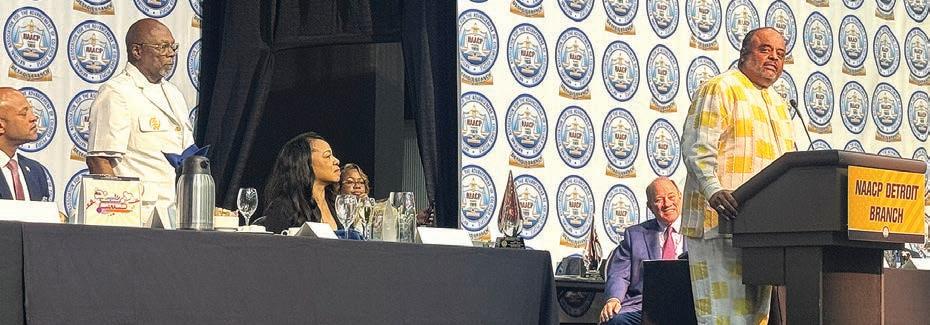
illegal carrying of firearms.
According to the City of Detroit, since the start of the fiscal year 2019 to 2021, Detroit saw a 28% decrease in the
On stage, Martin accepted the William Monroe Trotter Freedom and Justice Award.
“We gone fight until hell freezes
During the Great Migration, thousands of Black families from the South came to Detroit in search of jobs in the booming automobile industry. Despite facing discrimination and segregation, they built vibrant
off and when it does we’re gonna fight on the ice,” Martin said. Local and national leaders, including Maryland Gov. Wes Moore, Detroit Mayor Mike Duggan, and Lt. Gov. Garlin Gilchrist, joined clergy, activists, and organizations at downtown Detroit’s Huntington Place for what organizers call the largest sit-down dinner in the country.
“I say congratulations on 70 years of impact, on 70 years of
source development, on
community activism and on 70 years of progress,” Gilchrist told the crowd on stage. “Ya’ll this is our moment, this is a moment when our rights, when our ideas and identity is under assault. The tactics that worked last year, or last decade or last generation are not going to deliver the progress we need next year and for the next decade and next generation.” Gilchrist also thanked Detroit NAACP president
“We have strategically placed them at key points, “ Chief White explains. It has been a deterrent for some, and some have tested it. If you are legally carrying a weapon and carrying a CPL, have a great day. If you’re
From page A-1
the rights of all women are continued.
Jackson said she had supported Sheffield’s campaign for mayor before Kinloch announced his campaign in February. She also shed light on the screening and voting process, which determined which candidate would receive the union’s endorsement.
Elected officials are also working to keep Roe v. Wade intact thus holding off Michigan’s 1931 trigger ban. Gover nor Gretchen Whitmer released a statement saying, in part:
“Being at Region 1A, it seemed like a lot of those people were members of (Kinloch’s) church and had a personal relationship with him,” Jackson said. “I had a feeling before the vote that’s the way they were going to lean based on the interactions members had with him before and after he spoke.”
“The words ‘Roe over turned’ are no longer theoretical. I want every Michigander to know— no matter what happens in D.C., I’m going to fight like hell to protect access to safe, legal abortion in Michigan…”
Jackson said members were motivated by Kinloch’s support of the historic Stand Up Strike in 2023, which resulted in higher wages for union members thanks to aggressive negotiation tactics led by Fain.
“PPMI has been preparing for this moment since the results of the 2016 election were final. We recently filed a lawsuit to stop the 1931 law from going into effect, and we’ve also asked the state courts to affirm that the Michigan constitution does already contain a right to abortion. Our advocacy arm, Planned Parenthood Advocates of Michigan, is a founding member of the coalition that launched Reproductive Freedom for All, a ballot initiative to affirm the right to abortion and reproductive freedom in the state constitution,” said Vasquez Giroux.
“It was a big thing about how he supported the strike in 2023, and members from Local 900 and their president was there — they’re out of Wayne, Michigan.”
“The bottom line is that we will do everything in our power to keep abortion legal in Michigan, and if SCOTUS makes that impossible, we will do everything we can to ensure our patients can access the care they need.”
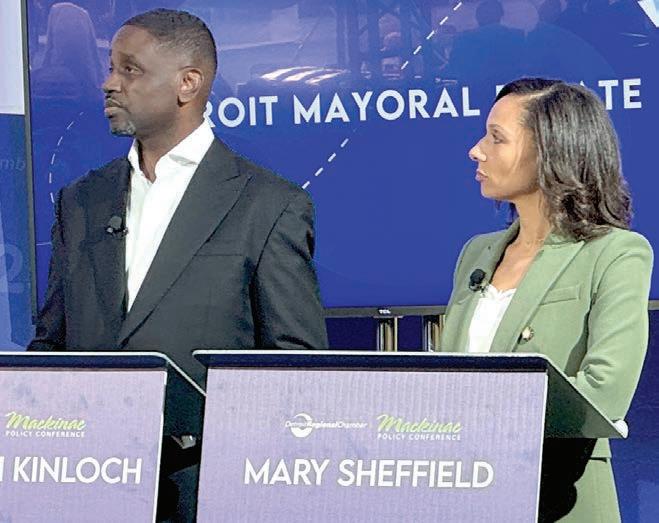
what the Supreme Court will rule in the upcomingsion, advocates on both sides of the argument are willing to continue their
become a parent is central to building and living a healthy, happy life,” said Vasquez Giroux.
There are more than 4,000 members among Local 7 and Local 51 — Jackson says some of those members are supporting Sheffield despite their leadership’s endorsement.
“They saw what auto workers for
From page A-1
More than legal impli cations, overturning Roe v. Wade would impact sev eral systems across the spectrum. With the potential to drive both foster and adoption numbers upward, a ban on abortions could leave many women to choose a less safe route restoring ‘back alley’ and illegal abortion practices, including self-abortions. Moreover, African American women and women of color, who already have a long-storied history with access and inclusion in medi-
education reform, workforce development, and affordable housing.
Beyond the scope of pro-choice versus prolife, the fight for reproductive choice is one of freedom. As Michigan officials work to ensure each woman who finds herself in the position to choose has access to care without the threat of legal action, many wonder
“Overturning Roe v. Wade would be a terrible break with nearly 50 years of judicial precedent and – more importantly – a blow against individual freedom. It is my hopeings of this draft. If that is not the case, we need toity Leader Schumer and Gov. Whitmer in support of their efforts to preservetive freedom,” said Chair Alisha Bell, on behalf of the Wayne County Commission.
Trump were doing where they were coming here setting up with their banners outside of our plant supporting Trump even though we had endorsed Harris,” Jackson said. “Why can’t we do that for Mary?”





the way.”
From page A-1 of starting the event late.
sive, people-centered, and unapologetically focused on the needs of Detroit’s most vulnerable.
islature adopts it.
Her leadership on the People’s Bills – a suite of ordinances aimed at expanding housing access, increasing community benefit agreements, and holding landlords accountable – has reshaped how Detroit’s local government engages issues of equity and inclusion.
corporate boards to have more diverse representation and pass the legislation.
Her mayoral campaign outlines priorities that speak directly to Detroiters’ lived experiences:
Increase school funding: Statutory changes to increase the School Aid Fund revenue by at least $3.6 billion and establish a permanent weighted funding formula based on student and community needs and universal preschool (0-3).
• Aggressive affordable housing policy, including expanding the Housing Trust Fund, enforcing rental code standards, and fighting displacement.
• Support for first-time homebuyers and legacy Detroiters seeking to own property in their own neighborhoods.
Better collection and analysis of criminal justice data: BLAC recommends data collection and professional analysis be initiated with the assistance of our Attorney General, Michigan Commission on Law Enforcement Standards (MCOLES), Association of Michigan Prosecutors and other stakeholders to collaborate, collect and analyze data strategically.
• Expansion of youth programming, including a "Youth Opportunity Guarantee" that would provide jobs, mentorship, and post-secondary pathways to Detroiters ages 14–24.
While his lack of experience in public office presents a challenge, his ability to build institutions, mobilize people, and scale results makes him a civic force whose influence will likely continue long after this campaign. Kinloch has demonstrated that he understands how to create and lead strong teams, and that he has the ability to be innovative and effective. He’s orchestrated food drives and tablet giveaways that consistently show that his love is for the people of the city. But despite that, he hasn’t outshined Sheffield or Jenkins during his campaign.
The health committee recommends reviewing state licensure policies to address the barriers that Black psychologists face in obtaining licensure in Michigan.
sentative with a deep understanding of Michigan politics, has unmatched experience in Lansing, where many of Detroit’s most important funding and policy battles are ultimately decided. His campaign has focused on government efficiency, regionalism, and equity—ideas that may not capture headlines but are essential to governing effectively. And as the leader of Detroit City Council’s Budget and Finance Committee, he understands the city’s future fiscal situation.
In between taking selfies with fans, Martin said he’s appreciative of the love he receives in Detroit.
The NAACP has advocated for the rights of Black Americans for 116 years. In recent years, the organization has advocated for the advancement of voting rights in South Carolina and Mississippi.
• Police accountability and justice reform, including restorative justice investments and mental health alternatives for public safety crises.
Reject censorship in history instruction: Encouraging Gov. Whitmer to ensure the goal for Michigan schools should be history instruction that is presented by professionals with the subject matter expertise, pedagogical skills, and judgment necessary to present complex information to students that are grounded in provable facts and add to the understanding of modern-day America.
Ensure equitable distribution of state health funds: Ensure all Michigan communities with a significant Black population receive adequate funds to address mental health issues.
Despite that, his platform hasn’t truly resonated with Detroiters in the way that Jenkins’ and Sheffield’s campaigns (or Kinloch's campaign) have. Regardless, Durhal has a bright future ahead of him in politics.
“I’ve only spoken here three times, but I got lots of support here,” Martin said. “I’ll say it was Aretha Franklin’s funeral in 2018 — the Queen and I were friends — I remember when I was livestreaming, I literally walked around the entire (church) where she was lying in wake and the long line all the way around. It was just crazy.”
Both men represent future-focused leadership that Detroit will continue to need—whether inside government or as part of a broader coalition for progress.
Protecting Black voting rights: Urge state officials to remain vigilant in the fight against schemes to disenfranchise Michiganders of color.
Why This Endorsement Matters
Ban no-knock warrants: Urging the House Government Operations Committee to hold hearings on HB 5013 and other legislation that would ban or limit the use of noknock or quick knock warrants, and urging the state legislature to pass meaningful reform and advise Gov. Whitmer to sign the bill after the leg-
Michigan Chronicle wanted to see his clearly and strongly presented plans for how to lead the city from a public policy approach, and he didn’t do so as effectively as Jenkins and Sheffield. Also, his decision to skip so many of the mayoral forums was an understandable campaign strategy – he went directly to individuals and smaller groups instead. However, it left so many people questioning why he failed to appear at the countless debates that have taken place multiple times per week around the city.
Sheffield’s passion for community-driven change is clear, and her willingness to challenge the status quo has earned her loyal supporters across the city.
But she is not without critics.
Increase mental health supports for the Black community: Recommending Michigan set a goal of increasing the number of Black mental health service providers by 20% each year over five years.
Durhal Has a Bright Future
Fred Durhal III, a current city councilmember and former state repre-
“BLAC members have worked hard to identify the needs of the Black community and we feel these recommendations will provide a solid first step towards breaking down barriers in education, community safety, health and business,” said BLAC Co-Chair Dr. Donna L. Bell.
Detroit is in a rare position this election cycle. The primary will send two candidates to the general election—giving voters a chance to decide what kind of leadership they want.
We believe the most meaningful choice Detroit can have in November is between Saunteel Jenkins and Mary Sheffield, and that’s why the Michigan Chronicle endorses Jenkins and Sheffield in the August primary.
President and CEO of the NAACP Derrick Johnson echoed Martin’s call in a letter to members ahead of the dinner, which pulled from the theme of Sunday’s event, “The Power is Within the People.”
“We are shifting from a posture of reaction to one that allows us to go boldly forward… We possess everything necessary to achieve our goals and the power to effect the changes we seek, and we are harnessing that power,” Johnson said. “We will rem committed and energized in our mission to build a more perfect union. regardless of obstacles along
Last summer, a federal court ruled in favor of the Mississippi State Conference of the NAACP, which alleged racial gerrymandering, ordering the state to redraw its 2022 state legislative maps. The court found that the maps unlawfully dilute the voting power of Black Mississippians by excluding densely populated Black districts.
“We’re committed to dismantling racism and disrupting inequality to create a society where all people can truly be free. This means addressing issues most important to the Black community,” said Yvonne White, president of the NAACP Michigan State Conference. “The NAACP Detroit Branch has always led the charge in making a difference to the complex, ongoing work of advancing racial equity and social justice in their community.”
the chancellor embraces.
“I think of transformational leadership as a thoughtful approach that causes people to change but also causes the systems and circumstances they are operating in to change too,” Ivory said.
Some in the business community have expressed concern that Sheffield is not perceived as business-friendly, which raises questions about how she would attract investment, create new revenue for the city, and manage the complex economic ecosystem that sustains a major American city. Others argue that several of her recent “wins” have less to do with her leadership than with the broader work of Mayor Mike Duggan’s administration, particularly on issues like streetlight restoration, park upgrades, and improved city services. While she has played a visible role in Council, she has sometimes benefited from accomplishments that were shaped and funded by the executive branch.
people believe that they need to for themselves and others to live better lives.”
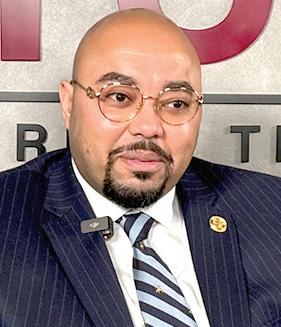
BLAC will hold a virtual town hall meeting to discuss its policy recommendations on ThursJoin BLAC and a virtual audiin discussing the recommendations to support the Black communi-
“Transformational change doesn’t just ask people to do certain things; it asks them to change their view of what’s possible and excites them to drive that change together because they believe that what they’re doing will create positive change for everyone. That’s how entire systems change because
Still, Sheffield deserves credit for pushing the conversation in City Hall. She has elevated topics (including tenant rights, community benefits, neighborhood equity, and more) that might otherwise have been sidelined. And she has grown more skilled as a coalition builder and policy architect over time.
“Chancellor Ivery is a true transformational leader and an outstand ing CEO, who is more than worthy of the CEO of the Year Award he just re ceived, “ said Prof. James C. Mays, who teaches entrepreneurship and supply chain manage ment at WCCCD’s Corpo rate College. “In his 27 years at WCCCD, Dr. Ivery has elevated WCCCD to become nationally recog nized for excellence and innovation and preparing our students profession ally and personally to do great things in the world.”
But Sheffield should be judged not by the history she could make, but by the depth of her agenda and her readiness to govern. Her ability to effectively campaign through fundraising, gathering volunteers, and delivering consistent messaging shows that she understands how to garner support –something the next mayor will need from residents. And on that score, Michigan Chronicle believes that she has earned her spot in the final round. Kinloch is A Strong Voice Who Adds to the Race
While Jenkins and Sheffield represent the two most complete and ready visions for Detroit’s next chapter, another candidate in the field who deserves serious recognition is Rev. Solomon Kinloch Jr.
Kinloch has brought energy and vigor to the mayoral race. As the senior pastor of Triumph Church, he has built one of the largest congregations in the country—40,000 members across eight campuses—through strategic growth, organizational discipline, and relentless optimism. That’s no small feat, and these are the kinds of transferable skills that could suit the next administration in a positive way. His campaign reflects that same entrepreneurial mindset, with ideas around
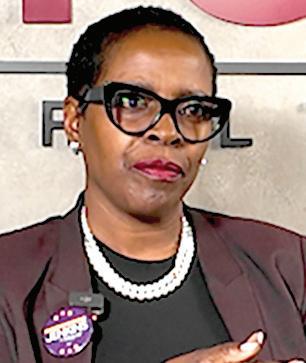
BLAC is housed in the Michigan Department of Labor and Economic OpMembers represent many professional backgrounds, including economics, law, public safety, health and wellness, arts and culture and media. They leverage their experiences and expertise to make recommendations to the governor on critical issues affecting
To learn more about BLAC and this upcoming www.michi-




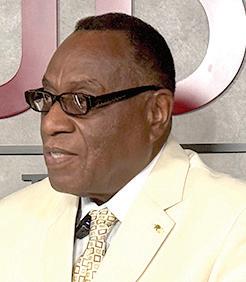
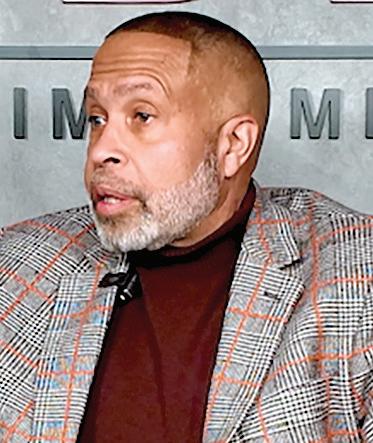

By Sam Robinson SENIOR REPORTER
Wayne County Commissioners appointed Detroit school board member Angelique Peterson-Mayberry on Wednesday to fill the seat left by Irma Clark-Coleman, who died last month.
Peterson-Mayberry held various positions with the Detroit Public Schools Community District Board of Education since 2017.
Her appointment fills the vacancy created by Commissioner Irma Clark-Coleman, a former state senator who died on June 11. She was 88 years old.
Peterson-Mayberry will represent the 5th District, which covers the north-central part of Detroit.
“With her experience in the Detroit schools, along with a successful career in the private sector with Ford Motor Company, I am confident Commissioner Peterson-Mayberry will be an immediate asset to the Commission,” Wayne County Commission Chair Alisha Bell, D-Detroit, said in a statement to Michigan Chronicle.

Peterson-Mayberry will need to run for re-election in 2026 to finish the term, which concludes at the end of 2028. She announced her resignation from the school board Wednesday on Facebook.
“After 8.5 incredible years of service on the Detroit Public Schools Community District Board of Education, l’ve officially stepped down to embrace a new chapter as a Wayne County Commissioner,” Peterson-Mayberry said in a post on social media. “I’m so grateful to God for the opportunity to serve with purpose, passion, and a heart for this community. Every challenge, every

By Jeremy Allen EXECUTIVE EDITOR
Recently, 125 Detroiters graduated from the Apple Developer Academy, completing a 10-month program focused on app development, coding, design, marketing, and project management. The academy, a partnership between Michigan State University, Apple, and the Gilbert Family Foundation, aims to prepare local residents for careers in the tech industry and beyond. The Apple Developer Academy proudly celebrated its fourth cohort of graduates—Detroiters ranging in age from 18 to 72—who now carry the tools and knowledge to shape the future of technology.
This year’s graduating class is a reflection of both the academy’s inclusive philosophy and Detroit’s continued emergence as a hub for innovation. With training in app development, coding, design, marketing, and project management, the graduates are poised to enter the competitive world of tech or to blaze new trails through entrepreneurship. The curriculum even includes a growing emphasis on artificial intelligence, preparing learners for the rapidly evolving needs of the digital economy.
“Congratulations to the Apple Developer Academy class of 2025,” said MSU President Kevin M. Guskiewicz, Ph.D. “Our thriving partnership with Apple and its robust application development curriculum has helped prepare hundreds of graduates for in-demand, solution-driven careers in
fields such as coding, marketing, design and entrepreneurship. I also want to thank the Gilbert Family Foundation for their continued support in helping to bolster the academy’s presence in the city of Detroit and connecting graduates with internships and careers to contribute to Detroit’s growing economy.”
The academy, now in its fourth year, was launched in 2021 as the first of its kind in the United States. It represents a powerful convergence of academic rigor, industry support, and community investment. With the Gilbert Family Foundation’s involvement, the program has been able to deepen its roots in Detroit by expanding career pipelines and ensuring students have opportunities well beyond the classroom.
“As Detroit continues to emerge as a national hub for technology, the Apple Developer Academy is creating pathways for Detroiters of all backgrounds to gain the skills, confidence and connections they need to launch successful careers in the tech industry,” said Laura Grannemann, executive director, Gilbert Family Foundation. “We are proud to support this important program, which is the only one of its kind in the U.S.”
But the academy doesn’t stop after one year. Graduates can apply for the Renaissance program, a second-year track that offers more advanced training and the opportunity to collaborate directly with Detroit institutions and businesses. Participants in the Renaissance program gain hands-on experience through partnerships
with groups like the Detroit Historical Museum and local design firms such as Parini. They also receive guidance on entrepreneurship, workforce readiness, and financial literacy, with support from the MSU Federal Credit Union and other community organizations.
“We couldn’t be prouder of what students have been able to accomplish these last four years at the academy,” said Alisha Johnson Wilder, Apple’s senior director, Environment, Policy and Social Initiatives. “There’s incredible innovation coming out of Detroit, and it’s amazing to see how coding continues to serve as a bridge between ideas and impact among this year’s graduates.”
For some graduates, like Hamza Crichlow, the journey has been deeply personal. A former respiratory therapist with seven years in the medical field, Crichlow came to the academy seeking a new path. His project, Pulmoro, is a powerful example of how the academy encourages students to draw from their life experiences. Pulmoro is designed to assist healthcare professionals in treating respiratory patients by interpreting arterial blood gas results and ventilator settings and delivering real-time treatment recommendations.
Crichlow’s innovation caught the attention of Apple at the global level—he was named a winner in Apple’s annual Swift Stu-
By Jeremy Allen EXECUTIVE EDITOR
More than $1 million in scholarships were awarded to high-achieving international students at the Fourth Annual Global Youth Leadership Conference (GYLC) in Nassau, The Bahamas, organized by The Memorial Foundation in partnership with a host of Historically Black Colleges and Universities (HBCUs).
Held in late spring 2025, the day-long summit welcomed more than 500 juniors and seniors— both in-person and virtually—to the University of The Bahamas, offering students a direct connection to HBCU opportunities, including on-the-spot admissions and financial aid. The event is part of The Memorial Foundation’s mission to build global youth leadership and increase access to higher education through the lens of the HBCU experience.
Launched by the Foundation in 2021, the Global Youth Leadership Conference in The Bahamas is designed to connect high-achieving international students with the cultural richness and academic promise of HBCUs. The 2025 gathering featured participation from several prominent institutions, including Clinton College (Rock Hill, South Carolina), Florida Memorial University (Miami Gardens, Florida), Harris-Stowe State University (St. Louis, Missouri), Morris Brown College (Atlanta, Georgia), and Philander Smith University (Little Rock, Arkansas). These colleges were represented by their presidents and senior leadership, offering a firsthand look at the academic programs, campus life, and community that define the HBCU experience.

With thousands of dollars in scholarships awarded on-site, the Foundation’s initiative served as a launchpad for dozens of students who may not have otherwise considered or had access to an HBCU education. In addition to the colleges physically present, several other institutions contributed to the scholarship effort remotely, including Benedict College

the United Negro College Fund (UNCF) spoke to attendees about pathways for international students to obtain philanthropic support for studying at HBCUs. His presence underscored the broad network of institutions and advocates committed to expanding access to education beyond American borders.
The Memorial Foundation is best known as the steward of the Martin Luther King, Jr. Memorial in Washington, D.C., but its work extends far beyond maintaining monuments. Through programs like the Global Youth Leadership Conference, the Foundation seeks to carry forward Dr. King’s vision of equality, opportunity, and service by investing in the next generation of global Black leaders.
The 2025 conference once again

brought that mission to life by providing students in The Bahamas a unique opportunity to envision a future at an HBCU—where academic excellence, cultural pride, and community empowerment converge. For many of the students who participated, the experience was more than a college fair—it was a transformative step toward their educational journey and personal development.
dent Challenge, one of only 350 winners worldwide. His recognition earned him a trip to the company’s prestigious Worldwide Developers Conference, where he engaged directly with Apple engineers and developers.
“I love the Apple Developer Academy,” Crichlow said. “It’s been cool to see a lot of like-minded people learning something together. When some of us started, we didn’t know anything about code or design, but now we all have our own app we are designing. A hopeful, optimistic view is what it’s given me.”
Crichlow’s next step is the Renaissance program, where he’ll build on the momentum from his first year. He’s part of a growing network of more than 1,400 academy participants and alumni, many of whom have gone on to create their own startups, enter tech roles in major companies, or return to the community as mentors and leaders.
The Apple Developer Academy stands out not
only for its curriculum but for its accessibility. There are no prerequisites—any Detroiter with an interest in technology and a commitment to learning is welcome. For those still unsure, the Apple Foundation Program provides an introductory, four-week crash course in the essentials of app development. It’s a stepping stone designed to spark curiosity and open doors. In a city with a legacy of reinvention and resilience, the Apple Developer Academy is helping write the next chapter – one where Detroiters not only participate in the tech economy but lead it. As each graduate walks away with a deeper skillset and broader perspective, the program’s impact becomes clear: its mission is about empowering people to create change, solve problems, and shape the future of their communities.
To learn more about how to apply or get involved, Detroit residents can visit the Apple Developer Academy website at developeracademy.msu.edu.
student, every decision has shaped me, and I carry those lessons forward. Though my seat has changed, my calling remains the same –to lead, to lift, and to love the people I serve.”


By awarding over $1 million in scholarships and expanding the visibility of HBCUs on an international stage, The Memorial Foundation is helping to ensure that the legacy of these institutions continues to thrive. The event demonstrated that education is not confined by geography and that the values embodied by HBCUs— leadership, service, resilience, and pride—resonate with students around the world.
DETROIT, MICHIGAN
The new county commissioner gave a shout-out to Superintendent Nikola Vitti, the DPSCD board, and district families and staff.
As the Global Youth Leadership Conference continues to grow each year, The Memorial Foundation’s commitment to youth empowerment and global education remains unwavering. For students in The Bahamas and beyond, the opportunity to connect with HBCUs is no longer a distant dream—it’s a real, tangible path forward.
OF DETROIT, MICHIGAN:
“…know that the person I am today has been shaped by our experiences, accomplishments, purpose, growth and commitment to our students and families,” she said.
Peterson-Mayberry was recognized as United Way
Woman of Influence in 2024, received the African American Leadership Educator Award in 2023, and was named March of Dimes Regional Chairwoman in 2022 and Green Garner National School Board Member of the Year Finalist in 2021. She’s a third generation UAW member, beginning her career as a custodian at Ford Motor Company nearly 30 years ago.
OTICE OF REGISTRATION FOR THE MUNICIPAL PRIMARY ELECTION TO BE HELD ON TUESDAY, AUGUST 5, 2025
“The value of labor was instilled in Angelique at a very early age and attending protests; marches; and community meetings with her mom was just a routine way of life in her home,” her bio on the DPSCD website reads.
PLEASE TAKE NOTICE that any qualified elector of Detroit, Michigan who is not already registered, register to vote at the office of the Detroit Department of Elections, the office of the Detroit City Clerk, office of the County Clerk, a Secretary of State branch office, or other designated state agency. Registration forms can be obtained at mi.gov/vote and mailed to the Detroit Department of Elections or the Detroit City Clerk’s Office. Voters who are already registered may update their registration at www.expressSOS.com
Scan the QR Code to Watch the Detroit Mayoral Candidate Interviews with the Michigan Chronicle!

The last day to register in any manner other than in-person with the local clerk is Monday, July 21, 2025
After this date, anyone who qualifies as an elector may register to vote in person with proof of residency 168.492) at the Detroit Department of Elections or the Detroit City Clerk’s office.

Department of Elections City Clerk’s Office (Coleman A. Young Municipal 2978 W. Grand Blvd. 2 Woodward
HOURS OF OPERATION:
NOTICE OF REGISTRATION FOR THE MUNICIPAL PRIMARY ELECTION TO BE HELD ON TUESDAY, AUGUST 5, 2025 DETROIT, MICHIGAN
• Regular business hours: Monday through Friday from 8:00 a.m. to 5:00 p.m. (Department of Elections)
TO THE QUALIFIED ELECTORS OF DETROIT, MICHIGAN:
• Monday through Friday from 9:00 a.m. to 4:00 p.m. (City Clerk’s Office)
PLEASE TAKE NOTICE that any qualified elector of Detroit, Michigan who is not already registered, may register to vote at the office of the Detroit Department of Elections, the office of the Detroit City Clerk, the office of the County Clerk, a Secretary of State branch office, or other designated state agency. Registration forms can be obtained at mi.gov/vote and mailed to the Detroit Department of Elections or the Detroit City Clerk’s Office. Voters who are already registered may update their registration at www.expressSOS.com.
• Saturday, August 2nd from 8:00 a.m. to 4:00 p.m. and Sunday, August 3rd from 9:00 a.m. to 4:00 (Department of Elections)
• Monday, August 4th – Absentee Voting ceases at 4:00 p.m.
The last day to register in any manner other than in-person with the local clerk is Monday, July 21, 2025.
• Election Day, Tuesday, August 5th from 7:00 a.m. to 8:00 p.m.
After this date, anyone who qualifies as an elector may register to vote in person with proof of residency (MCL 168.492) at the Detroit Department of Elections or the Detroit City Clerk’s office.
Department of Elections City Clerk’s Office (Coleman A. Young Municipal Ctr.)* 2 978 W. Grand Blvd. 2 Woodward Ave. Ste. 106 Detroit, MI 48202 Detroit, MI 48226
PLEASE TAKE NOTICE that the City of Detroit will be voting in the Primary Election for the following offices:
HOURS OF OPERATION:
• Mayor • City Council At Large

• Regular business hours: Monday through Friday from 8:00 a.m. to 5:00 p.m. (Department of Elections)
• Monday through Friday from 9:00 a.m. to 4:00 p.m. (City Clerk’s Office)
• Saturday, August 2nd from 8:00 a.m. to 4:00 p.m. and Sunday, August 3rd from 8:00 a.m. to 4:00 p.m. (Department of Elections)
• City Council District 2
• Monday, August 4th – Absentee Voting ceases at 4:00 p.m.
• Election Day, Tuesday, August 5th from 7:00 a.m. to 8:00 p.m.
• City Council District 5
PLEASE TAKE NOTICE that the City of Detroit will be voting in the Municipal Primary Election for the following offices:
• City Council District 7
• Mayor
• City Council At-Large
• City Council District 2
• City Council District 5
Persons with disabilities needing accommodations should contact the Department of Elections at 313-876-VOTE (8683).
•City Council District 7
Persons with disabilities needing accommodations should contact the Department of Elections at 313-876-VOTE (8683).


JANICE M. WINFREY
Use your Smartphone’s camera to scan the below QR Code for more access! Be sure to sign up for
Taxing speculators more for sitting on
unused land is a priority for Detroit mayoral candidate Fred Durhal, who wants to slash $500 off property tax bills for Detroit homeowners.
Durhal told the Michigan Chronicle in an interview last week the goal of the proposal is to ensure productive use of land across the city. He wants the city to get aggressive, going after owners of blighted property.
His plan is to lower the property tax millage for residents by about 19.5 mills and make up for it by charging speculators more.
“Folks who are either sitting on land that is non-owner occupied or is underdeveloped. We always use the example of flat lot structures that have 50-60 cars parked right on them to generate $2-3 million in revenue but only pay about $10,000 in property taxes,” Durhal said. “We’re going to charge them more so residents pay less.”
Durhal also wants to introduce a blight tax to charge 25 times the property tax millage for non-owner occupied structures on commercial corridors, as well as in the neighborhoods.
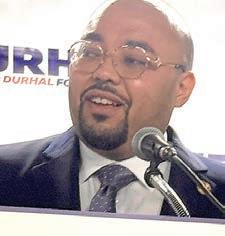
“Folks come up here, they buy 10 or 15 houses — they don’t live in the city of Detroit or even live in state, which means families can’t get homes,” Durhal said. “Whether it’s on Schoolcraft, or Greenfield, you have folks who have owned parcels for years and they’re waiting to sell it because they know that property values are rising. If you’re going to do that, at least keep these properties up. Make sure the roof isn’t falling in. Make sure it’s not a danger to residents, that you’re cutting the grass so the neighbors don’t have to go through that.”
Durhal’s plan would charge developers who are contributing to blight by sitting on land that isn’t being used. Developers buying up parcels typically are looking for contiguous land to be able to develop it for a large project to the highest bidder.
The other part of the proposal includes a property tax relief fund that will allow the city to reduce its debt millage, which adds to the property tax burden of residents.
The city approved in its latest fiscal budget a tax break for residents that will put, on average, an extra $100 in the pockets of residents. Durhal says bringing these plans together comprehensively, which will require help from state legislators in Lansing, would save residents $400-$600 dollars.
“Detroit is an old city,” Durhal said. “A lot of these structures have sat vacant for years, and change hands. It takes a money and capital to develop these structures, and the longer we let them sit, the more blighted they’ll become. I think we’ll start to see growth in corridors across the city.”
Some properties that have been vacant for over 20 years are just now starting to see stabilization after the city demolished abandoned as part of Mayor Mike Duggan’s strategy. Durhal also points to the mass property abandonment that took place after the 1967 race riots.
“We saw our automotive industry move out of the city of Detroit, you saw a lot of it then,

By Ebony JJ Curry SENIOR REPORTER
From high school co-op to corner office, Joi Harris’ story isn’t just one of corporate ascent—it’s one of Detroit’s legacy, Black excellence, and community-rooted leadership that has been decades in the making. On September 8, Harris will officially take the reins as president and CEO of DTE Energy, becoming the first woman to lead the Detroit-based energy giant. Her appointment marks a historic milestone not only for the company but for a city built on grit, brilliance, and generations of Black leaders who have poured into their communities—often without recognition.
DTE’s board of directors voted unanimously to elevate Harris to the role following the planned transition of current CEO Jerry Norcia, who will move into the position of executive chair. The promotion is the culmination of a multi-year succession plan, one that puts Harris at the helm of a $1 billion infrastructure strategy, an evolving energy grid, and the very future of how Southeast Michigan powers itself.
“I am honored to take on this role at such a pivotal moment for our company and industry,” Harris said in a statement.
“We are in a time of transformation, and I’m committed to executing our strategy with urgency—modernizing infrastructure, delivering for our customers, and building the energy systems that will power future generations.”
This moment was not gifted—it was earned. Harris began her journey with DTE 34 years ago as a high school engi-
neering co-op. By 1991, she was a fulltime employee, stepping into a world that wasn’t always built to see Black women lead—let alone engineer the kind of future she’s now constructing. Her rise through the ranks reflects her deep knowledge of the energy sector, her ability to move infrastructure forward, and her commitment to ensuring Detroit isn’t left behind in conversations about innovation, access, or equity.
As DTE’s current president and chief operating officer, Harris has already overseen the utility’s electric and gas operations, customer service, IT, and safety departments. Under her leadership, the company launched the $1 billion Blue Water Energy Center in St. Clair County, a natural gas-powered plant that opened in 2022 and was designed to reduce emissions while providing consistent energy delivery across the region.
Company officials noted that Harris was a key force behind DTE’s increased investment in electric grid modernization, resulting in a 70% year-over-year improvement in electric reliability in 2024—a major feat in a city and region often vulnerable to aging infrastructure and power outages.
But for Harris, the work has never just been about megawatts and data points. It’s about people. That commitment was clear at Michigan Chronicle’s Pancakes and Politics forum, where she called attention to the importance of preparing the next generation—especially Black youth—for leadership through mentorship and meaningful career pathways.
“We need to be intentional about creating space for young Black students
to see what’s possible,” Harris shared during the forum, addressing how early exposure to engineering and energy careers can open the door to lives of purpose and possibility. Her advocacy for internships and mentorship programs, especially those targeting underrepresented youth, is rooted in her own story—and it’s a philosophy she carries into every boardroom and every blueprint.
That philosophy is also visible in her work outside of DTE. Harris serves as vice president of the board for the Detroit Area Pre-College Engineering Program (DAPCEP), a program that has changed the trajectory of countless Black students interested in STEM. She also sits on the Wayne State University College of Engineering Board of Visitors, the Association of Edison Illuminating Companies Board, and the Board of Trustees for the Skillman Foundation, which continues to be a major force in youth empowerment across Detroit.
Her academic roots are as local and legacy-building as her professional ones. Harris earned both her bachelor’s and master’s degrees from Wayne State University, reinforcing a Detroit-grown journey that has not only shaped her leadership style but positioned her as an exemplar of what it means to serve, transform, and uplift at the same time. DTE, one of the largest energy companies in the Midwest, serves 2.3 million electric customers in Southeast Michigan and 1.3 million natural gas customers throughout the state. Historically, utilities have struggled with both environmental accountability and equitable
By Ebony JJ Curry SENIOR REPORTER
The clock struck midnight on Michigan’s fiscal calendar, and silence echoed through the state Capitol halls. There was no final vote. No handshake across the aisle. No resolution. Michigan lawmakers walked away without passing a budget for K-12 schools, leaving districts across the state— urban and rural alike—stranded at the starting line of a new fiscal year with no roadmap and no clear dollar amount to plan by.
This isn’t just about spreadsheets or delayed memos. This is about children who will walk into classrooms this fall not knowing if their school will be able to afford a social worker. This is about teachers expected to teach through trauma without the certainty of resources they need. This is about school leaders forced to manage payroll, programming, and student support services with no confirmed funding while policymakers posture and punt responsibility.
For many districts, especially those serving Black, Brown, and lower-income communities, the stakes are layered and personal. They are the ones disproportion-
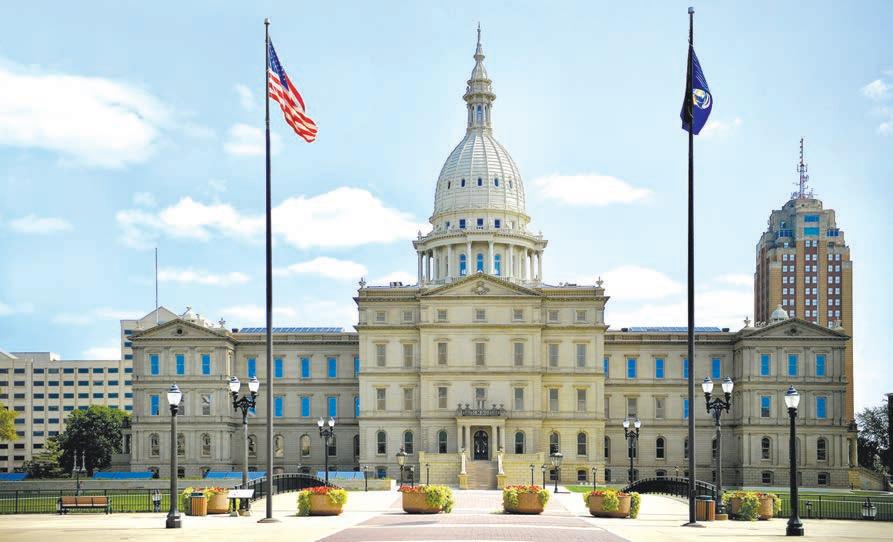
health, equity programs, and student nutrition. These are not abstract budget lines; these are the programs that determine whether a child gets a hot lunch, whether a teacher can refer a student to a counselor, and whether a district can safely transport students who live far from the schoolhouse door.
To Michigan’s majority-Black and working-class communities, these aren’t political footballs. They are lifelines.
Now, schools across the state have entered the new fiscal year blindfolded. There is no statutory penalty for lawmakers missing the deadline. No formal consequences. But communities are left holding the bag. Superintendents are already issuing warnings that hiring decisions may stall, supply orders might freeze, and programming—especially those intended to close racial and economic gaps—could face disruption.
The real penalty plays out quietly, day by day, when students show up to under-resourced classrooms and families are left wondering whether their child will have access to the support they need.
The divide between chambers isn’t just about dollars. It’s about values. It’s about whether the state sees education as transactional or transformational. It’s about whether lawmakers understand that for many Michigan communities, especially those that have long been on the margins, school is more than just a place to learn—it’s a sanctuary, a source of meals, a pipeline to opportunity, and sometimes the only consistent thing in a child’s life.
Senator Brinks’ call for a “better budget” should be taken seriously—but so should the cost of delay. Lawmakers must reconcile urgency with thoroughness and transparency with negotiation. It’s not about rushing through legislation. It’s about respecting the communities that can’t afford to wait.
The decision to adjourn, with no resolution, no set return date, and no passed budget, sends a message that should not be ignored. It says the Capitol’s clock does not tick on the same schedule as families who live paycheck to paycheck or schools trying to plan a school year without knowing if the roof will leak or the school nurse will be funded.
If there is to be a turning point in this stalemate, it must be rooted in prioritizing people over politics. Michigan has the resources. The Legislature has the authority. What’s lacking is the collective will to meet this moment.
Until lawmakers return—whenever that may be—school districts will remain in limbo. And while the Capitol lights dimmed last Tuesday night, the real work continues on the frontlines: in classrooms, kitchens, and community rooms across this state. The educators, school staff, and families they serve deserve more than platitudes and political strategy. They deserve a budget that affirms their value, that arrives on time, and that reflects the state’s commitment to equity and excellence for all children.
Michigan’s school funding debate is not just a negotiation between Senate Democrats and House Republicans. It’s a test of leadership, a question of moral clarity, and a reflection of what this state truly values.
The students are watching. The communities are waiting. And the delay carries a cost that numbers alone can’t quantify.
investment. Harris now leads during a moment of deep scrutiny and demand for reform, where community trust must be rebuilt and re-earned—especially in Detroit’s predominantly Black neighborhoods, where outages and environmental concerns often hit hardest.
Former CEO Jerry Norcia acknowledged Harris’ leadership, calling her “a respected, strategic thinker known for driving results with focus and precision.” He added, “She brings clear-eyed judgment, purpose-driven leadership and an unwavering commitment to what matters most to our customers, employees, investors, and communities.”
Norcia, who became CEO in 2019 and joined DTE in 2002, will continue to support Harris as executive chair of the board. His own legacy includes the creation of the Low-Income Self-Sufficiency Program, a precursor to the
Michigan Energy Assistance Program (MEAP), which was recently passed into law by Gov. Gretchen Whitmer. The program helps vulnerable residents avoid shut-offs and navigate energy burdens—an issue that disproportionately impacts Black and Brown households.
Still, Harris’ leadership signals a broader shift. It’s a nod to the urgency of infrastructure reform, the demand for environmental justice, and the opportunity for Detroiters to shape energy policy from within. It’s also a cultural moment worth honoring: a Black woman from Detroit who came through the public pipeline, mentored by her city and her company, now poised to shape how millions of families across Michigan live, work, and stay warm.
Her track record has not gone unnoticed. Harris was honored as Woman of the Year through the Michigan Chronicle’s Women of Excellence program and received the Maverick Award from Energetic Women, a national recognition for trailblazing leadership in engineer-
but you also saw it during the 2008 foreclosure crisis,” Durhal said.
Durhal says blight tickets currently cost developers next to nothing. Those with the ability to own multiple structures have the ability to pay a $500 fine for blight.
“You’re going to pay that at the end of the year and that’s it. When we charge 25 times more for that land, what we’re saying you’ll see is that owners will find a productive use, sell that land or get up off it,” Durhal said. “Our residents deserve to have neighborhoods and structures in them to put families in, or businesses in our commercial corridors.”
Other candidates running for mayor have also pitched ideas to generate new revenues through an “amusement” tax that would add a sales tax for admission to sporting events, concerts, and large events.
City Council President Mary Sheffield, who is also running for mayor, has pointed to a Citizens Research Council of Michigan study for a local amusement tax. The Citizens Research Council study showed an amusement tax with a $3 fee on tickets would raise nearly $8 million from Tigers, Lions, and other events held at Ford Field or Little Caesars Arena based on 2022 attendance records.
Nonprofit CEO and mayoral candidate Saunteel Jenkins has also pitched a new sales tax that she says would bring the city over $100 million.
“I would find a new revenue source such as what I’m calling a ‘penny for Detroiters’ local tax. That 1 cent can generate over $100 million, which would give us a revenue source that enables us to dramatically reduce our property taxes and make it more affordable to buy a home and live here,” Jenkins said at the WDIV debate last month.
ing and operations.
This next chapter isn’t about optics. It’s about what happens when Black women lead energy systems with care and accountability. It’s about holding corporations responsible for their impact while making space for the community to thrive alongside the infrastructure being built.
From the halls of DAPCEP to the boardrooms of one of the most powerful companies in the state, Harris’ rise is a call to action. For companies to truly invest in equity. For cities to trust Black women to lead. And for Black youth across Detroit to know that their ideas, their roots, and their brilliance belong in every conversation about the future.
As Harris prepares to step into her new role this fall, Detroit watches. Not with surprise but with pride. Because when you’ve built your leadership brick by brick, over three decades, in the very community you serve—this moment isn’t just deserved; it’s inevitable. Joi Harris is that leader. And this is her time.




By Ebony JJ Curry SENIOR REPORTER
The U.S. Senate has voted
51–50 to advance what President Trump calls the “Big Beautiful Bill.” But here in Detroit, where nearly half of residents rely on Medicaid and hundreds of thousands depend on SNAP to afford groceries, there’s another name being used: the “Big Ugly Bill.”
This legislation, if passed by the House, would gut critical federal programs that provide food and health care to working-class families, especially in Michigan’s majority-Black communities.
Medicaid and SNAP, long-standing programs that support the daily survival of children, elders, veterans, and working parents, are now on the chopping block in exchange for a $4.5 trillion tax cut package that favors the wealthy and large corporations.
Wayne County Commission
Chair Alisha Bell is among the many Detroit-area leaders raising concern.
“So the bill that is in the Congress right now, passed by the Senate and now in the House of Representatives, is called the Big Beautiful Bill,” Bell said. “But I care to differ from that—it’s the Big Ugly Bill because of what it does to families across the country, but specifically here in Michigan and in Wayne County.”
Bell points directly to the programs at risk. “It’s gonna affect those persons on Medicaid, it’s gonna affect those persons who have SNAP and food stamp benefits. And I think that is absolutely unconscionable—to harm the least of these,” she said. “The people who are on these services are the least of these who need those services. And to remove them— they’re not gonna know where their medical care is gonna come from. Some of them may not know where their food is gonna come from. So it’s going to negatively impact so many people in Wayne County and in Michigan.”
Medicaid currently covers between 2.3 to 2.6 million Michiganders. In Detroit alone, 45.6% of residents are enrolled in the program. It covers 65.9% of Black births in the state and supports working families, disabled residents, and seniors alike. More than 70% of adults on Medicaid in Michigan are employed—many in jobs that do not provide private insurance.
At the same time, SNAP supports over 1.3 million Michiganders with basic food assistance. In Wayne County, more than 434,000 people received SNAP benefits in 2022. The average monthly benefit in Michigan was $173 per person or $325 per household—amounts that may be modest but often mean the difference between skipping meals or not.
Under the proposed legislation, both programs would face deep cuts. The Congressional Budget Office projects that 11.8 million Americans could lose Medicaid coverage over the next decade. Governor Gretchen Whitmer has warned that the cuts to SNAP
Several statewide groups are working to ban political contributions from utility companies like DTE, Consumers Energy and corporations that hold state and local government contracts.
Organizers with Voters Not Politicians and Michigan United Action said Monday they will be leading an all-out effort to put a proposal on the ballot that would change how politicians are able to raise money.
Michiganders for Money Out of Politics leaders said DTE and Consumers Energy have dumped millions into Lansing to escape accountability, while Michiganders pay the highest electric rates in the Midwest for the worst power outages.
Sean McBrearty, the state director of Clean Water Action and vice chair of Michiganders for Money Out of Politics, told reporters during a press conference Monday on Zoom that the coalition will look for support from residents across the political spectrum to restrain the power of large corporations that spend millions each year through nonprofits to influence the decisions of lawmakers.
McBrearty said all residents should be united against the worst examples of corporate influence — when corporations become reliant on government support and intervention for their profits.
“Whether you’re a card-carrying member of Democratic Socialists of America, or a MAGA hat wearing Republican, or anything in between, we hope to earn your


would create a $467 million shortfall in Michigan’s food assistance budget. That gap will hit cities like Detroit first, where the need is highest, and grocery access is already limited.
Danielle Atkinson, Executive Director of Mothering Justice, calls the bill what it is: a betrayal.
“While Republicans prioritize tax breaks for billionaires, they’re simultaneously stripping away basic healthcare and support systems from those who need them most,” Atkinson said. “Trump’s ‘Big Beautiful Bill’ should actually be called the ‘Big Betrayal Bill’—because if it’s passed into law, the wealth gap in this country will widen to astronomical levels. Mothers of color and working families across the country did not elect their representatives to protect the ultra-wealthy.
people, that will fall down to the county level. So we don’t know what the impact is going to be yet, but I suspect it would be very negatively impactful for our budget as we try to provide that gap for those persons who may not have their Medicaid coverage or their SNAP program.”
When the federal government is no longer taking care of people, that will fall down to the county level. So we don’t know what the impact is going to be yet, but I suspect it would be very negatively impactful for our budget as we try to provide that gap for those persons who may not have their Medicaid coverage or their SNAP program.”
Rand Paul, Susan Collins, and Thom Tillis—also opposed it. Yet the bill passed with Vice President JD Vance casting the tie-breaking vote. This supersedes much further than numbers. It’s about the every day realities Detroiters will face if these cuts go through. Fewer children get their yearly checkups. More emergency room visits could have been prevented. Parents are forced to skip meals so their kids can eat. Seniors rationing medications to make ends meet.
– Wayne County Commission Chair Alisha Bell
The GOP made one thing clear: if they are left in charge, working-class families will always come last.”
The harm doesn’t stop at the individual level. Chairwoman Bell warned that the financial impact will shift from federal budgets to already-strained county governments.
“Unfortunately, a lot of the costs that are gonna be cut—a lot of programs that are gonna be cut—are going to have to be taken up by counties and cities,” Bell said. “That’s gonna impact our budgets. When the federal government is no longer taking care of
It’s important to understand who’s being asked to carry this burden. These are working mothers, essential workers, children, the elderly, and those already living below the poverty line. Twothirds of SNAP recipients in Michigan are also on Medicaid. Nearly 60% of SNAP households include children, and another 39% support seniors or people with disabilities.
The bill, which includes a $350 billion allocation for border enforcement and raises the debt ceiling by $5 trillion, prioritizes tax relief for the wealthy over the daily survival of the people who are keeping this country moving. All 47 Senate Democrats voted against it. Three Republicans—
Chairwoman Bell issued a call to action to the people of Wayne County. “Where I’m sitting, we have to act. I’m glad that the majority of our Congress people from Wayne County are in opposition to the bill,” she said. “But for those who are considering voting for it, I would have them listen to their constituents. I would have the residents of Wayne County reach out to those members in Congress who are considering voting for that bill—and tell them how it will affect them directly. I think sometimes the elected officials need to hear personal stories on how not having these services is going to really impact their lives. And if they heard those personal stories, they would be apt not to vote for this bill—and to really take care of the people they represent in their community.”
The House will vote next. That decision will determine whether

support,” McBrearty said, adding that it will take a grassroots movement counter corporate money’s influence.
Ponsella Hardaway said the groups are taking a huge risk going against giant corporations with virtually unlimited spending power.
“We cannot be polarized and paralyzed by big corporations that we can’t get the things that we need done (to improve) the quality of our lives,” Hardaway said. “This is about David versus Goliath and I think we’re ready to take this risk, we have to, we don’t have a choice.”
Organizers said the ballot language will be presented to the State Board of Canvassers in July, with a goal to collect 357,000 valid signatures for the November 2026 ballot.
“This policy will help us release
our Legislature from the corporate capture that it is currently enduring so that our politicians can work to serve the people of Michigan,” said Kim Murphy-Kovalick, senior director of policy and programs for Voters Not Politicians.
Voters Not Politicians was the group that led the effort to reform Michigan’s gerrymandered political district maps thanks to the successful ballot initiative in 2018.
Representatives from Michigan United Action and Clean Water Action are also part of the coalition and spoke about what they said was the corruptive nature corporations having a say in Michigan’s lawmaking process at the press conference Monday.
Ken Whittaker of Michigan
United Action said each group will motivate people around the state to raise money for the campaign, which will face steep opposition from corporations seeking to
wield power over the state’s political leaders.
“Even though we have Citizens United, money doesn’t walk into a ballot box and vote — people do,” Whittaker said. “We are organizing people in all 83 counties and plan to be victorious at the ballot.”
Leaders also said they expect it to become easier for state legislators to support corporate accountability measures if their initiative is passed.
“We know that DTE and Consumers are going to spend as much money as it takes fighting us on this, because no matter how much money they spend fighting us on this, it’s cheaper for them to actually fix their crumbling infrastructure,” McBrearty said. “We decided to include utility companies because it is a regulated industry that has a monopoly on services in Michigan. There is a strong record of fact that DTE and Consumers
hundreds of thousands of Michigan residents continue receiving basic medical care and food support—or whether they’re left to figure it out on their own.
And while national headlines focus on political wins and losses, here in Detroit, the question is simple: who’s looking out for the people?
This bill isn’t just about dollars. It’s about values. It’s about whether our leaders believe poor and working-class families deserve to live with dignity. And it’s about whether they’re willing to listen— not just to lobbyists and donors— but to the voices of the people they represent.
Detroit has made it clear. These cuts would hurt the most vulnerable, shift the burden onto local governments, and deepen inequality in a city already working to rebuild.
The clock is ticking. The voices of Detroit’s mothers, grandmothers, students, caregivers, veterans, and working people are rising. Congress needs to hear them—loud, clear, and urgently.
Because when families are forced to choose between food and health care, we all lose. And if this bill moves forward unchanged, the harm won’t be abstract. It’ll be felt on every block in Wayne County, and every household already stretched to its limit.
This moment demands more than quiet concern. It demands a response rooted in care, justice, and truth.
Detroit deserves better. And it’s time for Congress to prove they understand what’s truly at stake.
have a corrupting influence on the legislative process in Lansing.”
He said it isn’t a cure all for every problem with campaign finance, but a major step forward that will bring greater accountability.
Critics say energy companies have increased costumer energy rates without significant improvements to their power grid, despite having reported spending $1.5 billion to improve it. Earlier this year, DTE announced it would be seeking a $574 million rate increase from the Michigan Public Service Commission for 2026 — about an $11 increase.
“Just three months after the MPSC approved a $217 million rate hike, DTE is already back, asking for nearly $600 million more from ratepayers still very dissatisfied with the quality of service they receive,” Michigan Attorney General Dana Nessel said in a statement at the time. “At some point, we have to ask how long utility companies like DTE and Consumers Energy will be allowed to treat customer bills and our energy rates like a blank check.” Coalition organizers say there’s already precedent to ban utilities from political spending.
State governments such as Connecticut, Hawaii, New Jersey, and Georgia and federal agencies such as the Securities Exchange Commission have also banned political spending by monopoly corporations and corporations seeking government contracts, leaders said.

By Darryl Jacobs
CONTRIBUTING WRITER
ESPN & CBS SPORTS COMMENTATOR
The Detroit Pistons had just one selection in the 2025 NBA Draft—and while it came late in the second round, the decision to draft Tennessee guard Chaz Lanier at No. 37 overall could prove to be a critical move for the franchise.
On the surface, it might not have looked like much. The Pistons had no first-round pick, the result of a trade made back in 2020 with the Minnesota Timberwolves. But what Detroit lacked in early-round excitement, they made up for in strategic execution—addressing a roster need while staying true to their long-term vision.
Free Agency Realities: Why This Pick Mattered
Heading into the offseason, the Pistons face the potential loss of several key contributors. Five unrestricted free agents are on the market, including:
• Malik Beasley, who shattered Detroit’s single-season three-point record with 319, makes at a 41.6% clip.
• Dennis Schröder is a steady veteran presence in the backcourt.
• Tim Hardaway Jr. is a reliable scoring option on the wing.
• Paul Reed and Lindy Waters III are both serviceable role players.
The common thread among these names? Shooting and experience—two things Detroit will be hard-pressed to replace if multiple veterans leave in free agency. Beasley, in particular, played a central role in the team’s offensive spacing, opening up the floor for playmakers like Cade Cunningham and Jaden Ivey.
This looming loss of perimeter scoring made the selection of Lanier not only logical—but essential.
Lanier’s Profile: Ready-Made for Detroit
At 23 years old, Chaz Lanier isn’t your typical high-upside prospect. What he is, though, is one of the most accomplished shooters in this year’s draft class. Over the past two seasons—split between North Florida and Tennessee—Lanier knocked down 229 three-pointers, connecting at an elite 41.5% clip.
He’s particularly dangerous in catchand-shoot situations, with the footwork, speed, and confidence to thrive as a movement shooter. His game has drawn comparisons to veteran guard Malik Beasley—a timely parallel is given Beasley’s free agency status.
Lanier stands 6-foot-4, has a strong frame, and shows the competitiveness to defend on the perimeter. Though he won’t run an offense, his ability to stretch the floor, hit timely shots, and stay engaged defensively makes him an ideal role player for a team with playoff ambitions.
Langdon’s Blueprint: Flexibility with Purpose
This draft was the second under new team president Trajan Langdon, who has made it clear that “optionality” will guide Detroit’s roster strategy. That means building a team with flexibility—both financially and schematically—without overcommitting to short-term moves.
By Ebony JJ Curry SENIOR REPORTER
Detroit doesn’t need to reinvent itself to be relevant. This city has long been the birthplace of cultural brilliance and political resistance. That truth is echoed in the grounds chosen for AfroFuture’s U.S. debut this August. The festival will take place at Bedrock’s Douglass Site, land once home to the Frederick Douglass Homes—a public housing complex that stood as a symbol of Black family strength, resilience, and the layered challenges of urban renewal in Detroit. It’s where Black Detroiters built community and where Motown royalty once laid their heads at night. Before global fame, before the hit records, some of music’s greatest voices came from this neighborhood.
This August, the energy returns. AfroFuture Detroit will take root on the historic Douglass Site for its U.S. debut on August 16 and 17, 2025. But the festival doesn’t just appear. It grows through weeks of intentional community connection, honoring Black innovation, culture, and legacy. From August 11 to 28, Detroiters will witness a slate of events that serve as a cultural bridge—connecting the local to the global, the past to the next.

By Amber Ogden
Fresh off the high-octane thrill of the 2025 Chevrolet Detroit Grand Prix, the roar of engines barely had time to fade before another wave of racing fever gripped Michigan. From the tight turns of downtown Detroit to the wide-open speed of Brooklyn’s Michigan International Speedway for NASCAR, with back-to-back race weekends, the state continues to be a motorsports mecca, showcasing not just horsepower but heart, heritage, and high stakes.
This year’s Grand Prix wasn’t only about cars speeding through the streets of downtown. It was about reclaiming the Motor City’s automotive legacy through a cultural lens, one driven by creativity, representation, and a sense of purpose.
Murals painted by young artists from the Boys & Girls Clubs of Southeastern Michigan (BGCSM) lined the event space, community groups hosted tech showcases, and the presence of Black-owned Curry Motorsports sent a clear message: the future of racing includes everyone.
One of the most visible reflections of the Grand Prix’s community commitment came in the form of bold, eye-catching murals designed by BGCSM youth. This year marked the third consecutive year of partnership between the Grand Prix and the organization and the third year in which their artwork transformed the venue landscape into a gallery of aspiration and identity.
Michael Montri, President of the Chevrolet Detroit Grand Prix, presented by Lear, highlighted that the Grand Prix helps celebrate the city’s rich culture, along with the talent in the Detroit community.
“Thanks to the support of our dedicated Community Partners, the Grand Prix is able to create and foster unique engagement opportunities that give students across the City of Detroit an opportunity to shine,” Montri said.
And now, as the last streaks of tire marks fade from the track, the real story
continues, one that stretches from Detroit to Abu Dhabi, where a group of five BGCSM teens represented the city of Detroit on a global stage, coding autonomous vehicles and exploring the future of smart mobility.
Last summer, BGCSM traveled to Abu Dhabi, where they participated in an international mobility coding program centered on autonomous vehicle development. The trip, organized through a partnership with global technology firms and mobility researchers, represents a bold leap forward in preparing Detroit youth for the industries of the future.
The students collaborated to solve real-world transportation challenges using artificial intelligence, software programming, and design thinking. They’ll also tour innovation hubs and engage with mobility startups leading the autonomous revolution.
Sixteen-year-old Christian D says he was a bit nervous about taking the 12-plus-hour flight out of the country but learned that he works well in a team setting.
“We were working most of the time, we were coding,” Christian said.
“We would get two test hours every day. We would use those hours to test out our code and make sure everything was going well. Before this trip, I’ve always loved technology, so this has helped me love it even more.”
BGCSM Sonya Draper, Executive Director of Talent & Innovation, emphasized that the trip reflects the organization’s mission to provide exposure and access to youth from underserved communities.
“We’re on the pathway for providing economic mobility for our youth,” Draper said.
“We like to be ahead of the curve, providing our youth with exposure and exploration to careers that are thriving. These opportunities are vital for our youth, especially dealing with Black and Brown youth who aren’t normally exposed.”
At the heart of Detroit’s continued pas-

“Bringing AfroFuture to Detroit isn’t just about launching a festival, it’s about building a cultural movement that lives in the city long before the first stage is set,” said Abdul Karim Abdullah, CEO and co-founder of AfroFuture. “We’re building excitement from the ground up and our countdown events are a reflection of our commitment to engaging with the community, celebrating the diaspora, and creating spaces where creativity, connection, and culture thrive.”
The Douglass Site, located just north of Eastern Market, was once home to the Frederick Douglass Homes—public housing
that housed thousands of Black Detroiters over several generations. The complex was more than just housing; it was a cultural incubator. Motown’s brightest stars—Diana Ross, Smokey Robinson, and members of the Temptations—once lived within the area. The music that shaped the world was born in part from this very ground. After its demolition in 2014, the land remained quiet. This year, AfroFuture’s arrival brings purpose back to a place that was never forgotten.
The celebration begins Monday, August 11, with the AfroFuture Countdown Bar
sion for motorsports’ progress stands Curry Motorsports, the city’s first Black-owned racing team, founded by former University of Michigan football standout Julius Curry. Curry Motorsports made a visible impact during the Grand Prix weekend, announcing its upcoming five-week engine-building summer boot camp. They received a $25,000 investment, and it’s in partnership with the Detroit Auto Dealers Association and the Detroit Auto Show. Through these kinds of partnerships and technical training programs, Curry is building a pipeline that specifically introduces Black and Brown youth to careers in racing, automotive engineering, and high-performance vehicle technology.
“We wanted to just be a part of something in Detroit where we can really make sure we’re making an impact,” Curry said recently during the check presentation. The significance of introducing Black youth to motorsports goes beyond education. It touches on culture, history, and identity. The late Wendell Scott, the first Black driver to win a NASCAR race, has paved the way for racers such as 22-yearold Rajah Caruth, William Alexander Lester III, Formula One icon Lewis Hamilton, and Bubba Wallace, who have become symbolic beacons for young racers of color. Yet the representation gap remains wide.
Groups like the Urban Youth Racing School in Philadelphia and Detroit’s own mobility boot camps have shown how high-impact programs can shift narratives and open doors. The Grand Prix’s focus on inclusive programming is part of a national movement to diversify what’s long been a homogenous sport.
While the Grand Prix weekend delivered high-speed thrills and packed crowds, its broader impact is being felt far beyond the stands.
Grand Prix Chair Bud Denker spoke
Crawl. From 5 to 8 p.m. daily through August 15, Detroiters can visit iconic venues for specialty AfroFuture cocktails and vote for their favorites. Participating locations include Hush Harbor inside Fixins (August 11), Easy Peasy & Cure Nailhouse (August 12), The Vinyl Society (August 13), Paramita Sound (August 14), and Parlay (August 15). Guests unlock exclusive rewards, including limited-edition merch and VIP access.
Detroit’s culinary legacy steps into the spotlight during AfroFuture’s Taste of Detroit Restaurant Week, held from August 11 through 18. Participating Black-owned restaurants will offer prix-fixe lunch menus ranging from $20–$30 and dinner options from $55–$75. Cultural storytelling through food will take form at chef’s tables, demos, and community dinners. Confirmed restaurants include Kola Restaurant & Ultra Lounge, Ivy Kitchen and Cocktails, Salt + Ko, and Breadless. A full list is expected to follow. On August 13, from 6 to 9 p.m., AfroFuture partners with Black Tech Saturdays and Venture 313 for Diaspora Connect: Innovation for Global Black Futures at Techthree (6001 Cass Avenue). This pitch competition
offers up to $10,000 in equity-free funding to Black entrepreneurs building solutions in three categories: Digital Bridges & Cultural Exchange, Community Economic Development, and Creative Industries & Entertainment. Participants will also gain mentorship and media exposure.
AfroFuture will shift the tone to art and vulnerability on August 14 with “Poetry me, please–A Diasporic Spoken Word Experience.”
Hosted from 6 to 10 p.m. at Willis Show Bar, the night will feature live music and storytelling that centers on truth and transformation across the diaspora. The evening is curated in collaboration with Poetry Me, please, offering a platform for voices that often go unheard.
Afrocentric Movie Nights will take place every Thursday throughout August at Lowkey (1456 Woodward Avenue) in partnership with Cinema Lamont and Lowkey Cinema. Screenings begin at 8 p.m. and include “Space Is the Place” on August 14, “Crumbs” on August 21, and “Born in Flames” on August 28. These films offer sharp perspectives on Black futurism, resistance, and collective vision. Admission is free, and popcorn is provided.
On August 15 from 6 to 11 p.m., Samples n’ Friends teams up with AfroFuture to celebrate Black music’s layered legacy through trivia, karaoke, and community interaction. Attendees will engage with sampled tracks tied to AfroFuture artists, Afrobeats hits, and classic Detroit Motown records. The event will be hosted at Lowkey and merges education with celebration.

Bedrock. “AfroFuture Detroit and its leadup events will honor the deep ties between the city and the African diaspora, amplify diverse voices, and foster and strengthen meaningful connections.”

As the main event approaches, the lineup reflects the global reach of Black sound. Saturday’s headliner is Asake. Sunday belongs to Davido. The roster includes Kaytranada, Ludmilla, Gims, Flavour, Lojay, Tee Grizzley, King Promise, KiDi, FAVE, and DING DONG featuring Platinum Kids and Noah Powa. DJs bringing sound to life include Juls, DJ Obi, DJ Mo Beatz, DJ Prince, Ethan Tomas, DJ LAJ, and DJ RB Nice.
The Culture Stage will feature DJ Maphorisa, DBN Gogo, TxC, Tyler ICU, Donavan Glover, Ethereal, Jeanine Styles, DJ MOHOGANY, DJ K-Dawg & EZ Pass, Jerk X Jollof (Jae and Flygerian), Days Like This (DLT), Obi’s House, and Toasted Life.
didn’t make headlines, and didn’t add lottery talent. But what they did is precisely what smart front offices are built to do—identify a gap on the roster and fill it with a player who can help right away.
Lanier’s ability to shoot, space the floor, and complement Detroit’s core makes him more than just a second-round flyer. He’s a calculated investment—one that could pay dividends if Detroit loses multiple free agents this summer.
Looking Ahead
After a 30-win improvement in the 2024–25 season, the Pistons are trending upward. The challenge now is maintaining that momentum. With

the future of several key contributors uncertain, Detroit needed to ensure it didn’t lose ground offensively.
Chaz Lanier may not be the most talked-about pick in this year’s draft— but for the Pistons, he might be one of the most important.
DRAFT GRADE: A-
Darryl Jacobs is an ESPN & CBS Sports Network Commentator/Analyst, former successful college head coach, athletic administrator, and professional sports executive with over two decades of experience in collegiate athletics and professional sports.
get experience and doing what everyone else is doing is all a part of being inclusive.”
AfroFuture will also host a lineup of official pre- and after-parties. The Jerk x Jollof Pre-Party kicks off on August 15. On August 16, the city will come alive with the Obi’s House After Party, the Toasted Life After Party, and the R&B After Show and PVO. Closing the stretch is the Jerk x Jollof After Party on August 17. Tickets for these events will be available on detroit.afrofuture.com.
“Hosting AfroFuture’s U.S. debut in Detroit provides a great moment for the community to come together and experience so much more than just a festival,” said Kofi Bonner, CEO of
Hosting duties for the weekend will be carried by Young Prince, LOLAHSTIC, DJBJ 3525, and Lana LaDonna. Their presence brings familiarity, style, and rhythm rooted in Detroit’s own cultural pulse.
Two-day general admission ticket bundles (17+) became available on July 1 at 8 a.m. Each ticket includes access to all stages, Detroit-based and international food vendors, branded activations, refillable water stations, art installations, curated merchandise, and an artisan marketplace. Hotel blocks and Delta Airlines flight discounts are available now at detroit.afrofuture. com, where media professionals may also apply for credentials.
with youth media correspondents from BGCSM ahead of the Grand Prix about the significance of inclusion and the economic impact of the event on Detroit. He emphasized the importance of making the 2025 Grand Prix one of the most inclusive events that the city has ever seen.
“The fact that you can come down for half of our racetrack and watch for free, number one, that’s pretty good inclusion,” Denker said.
“The fact that we allow these Boys and Girls Clubs of Michigan to come in, [through] an artistic program, a Photoshop program, to design our barrier walls which are so beautiful, and the fact that we’ve now got correspondence courses with you all to have you
Though the checkered flags have been waved and the engines silenced, the 2025 Detroit Grand Prix has left behind more than memories. It’s left momentum for a renewed commitment to equity in education, innovation in mobility, and access in motorsports.
With Curry Motorsports championing representation on the track, BGCSM students showcasing their coding skills on the world stage, and a city invested in nurturing its next generation of builders and dreamers, Detroit isn’t just preserving its automotive legacy. It’s evolving it.
“Opportunities such as these will set these youth up on a pathway for success,” Draper said.

This payment plan reduces the interest rate from 18% to 6% per year for eligible taxpayers. To sign up, you must own and live in your home, and have a Principal Residence Exemption (PRE) and ID that proves residency.
Available to everybody, this plan allows a taxpayer to pay taxes pursuant to a payment schedule. The plan will avoid foreclosure provided that payments are submitted per the agreed upon schedule.
This program is not available to everyone. If you own and live in the property, and are su ering financial hardship, you may qualify for this program. Proof of ownership, occupancy, and hardship are required.
Only for taxpayers who live in a community that opted into the PAYS program, have applied for the Poverty Tax Exemption (PTE) at their local assessor’s o ice and were approved. Once notified by your local Assessor’s o ice and deemed eligible, our o ice will mail you a notification letter with your Reduced Amount Due. You will have the option of paying a lump sum (additional 10% o ) or enrolling into a PAYSPA.


Home renovations happen for a variety of reasons – whether to reflect personal style preferences, replace worn out materials or adapt to a family’s evolving functional needs. Among the most popular upgrades homeowners tackle, bathroom renovations can be a smart and worthwhile investment.
Updating a bathroom, even a small one, requires careful planning to ensure both aesthetic appeal and long-term functionality. To maximize the value of your investment, focus on a design that is timeless and products that offer a blend of beauty, comfort and performance.
“As a designer and renovator, I know firsthand the impact fixtures can have on a home,” said Keith Bynum, home renovation expert, designer and HGTV star.
“American Standard has been my go-to for renovation projects because their products are built to last, beautiful and timeless. The brand’s approach aligns with my own – creating stylish, convenient spaces with high-quality products that cater to real-life needs and improve the way we live.”
Discover these expert tips for selecting the perfect products for your bathroom upgrade from American Standard, a trusted leader in bathroom and kitchen plumbing fixtures that is celebrating 150 years of designing innovative products that are truly “built for life.”
Sinks Your sink should not only enhance the visual appeal of your bathroom but also meet your practical, everyday needs. Striking the right balance between aesthetics and practicality is essential when choosing the perfect sink for your space. If you’ve never shopped for a sink before, you may not realize how many styles there are to choose from.
An undermount sink sits with its edge below the level of the countertop, creating a seamless surface that makes it easier to clean while hiding from view. A dropin sink is placed into an opening with the rim creating a lip that forms a barrier between your sink and counter. A vessel sink resembles a standalone basin, often used as a decorative and contemporary alternative to traditional sinks in powder rooms. The sleek and clean design of a pedestal sink makes it a perfect solution for smaller spaces, although additional storage may be needed. Once you decide on the sink, you’ll also need to determine what furniture to pair with it. Some popular options to complete the look and enhance usability include a console, vanity top, floating vanity or washstand.

When considering a toilet, performance is essential. It should meet your everyday needs, operate efficiently and provide additional features that make daily maintenance easier.
You’ll find most toilets on the market fall into one of three categories: one-piece, two-piece or smart. Onepiece toilets have a seamless design, with the tank and bowl fused together for a look that is sleek and easier to clean. Two-piece toilets consist of a separate tank and bowl, making them a popular choice for easy installation and maintenance. Smart toilets offer advanced features like bidet functions, automatic flushing, self-cleaning capabilities and customizable settings designed to enhance user comfort, hygiene and convenience.
Another important consideration is your toilet’s shape and height. Elongated bowls provide added comfort while round bowls are a space-saving solution for smaller bathrooms. When it comes to height, standard toilets are suitable for most people, but higher toilets allow for easier standing and sitting accessibility.
An option like American Standard’s line of Champion toilets, engineered to never clog and powerful enough to flush a bucket of golf balls in a single flush, provide cleaner, more efficient flushes so nothing disrupts your daily routine. These DIY-

unique EverClean Antimicrobial Surface protection to guard against mold, mildew and odor- and stain-causing bacteria.
Faucets
Bathroom faucets come in a variety of styles and configurations to suit any design preference.Durable finishes resist tarnishing and scratches, keeping your faucet looking new for years to come. Many models also feature ceramic disc valves for silky-smooth handle operation and watersaving technology to help conserve resources and lower water bills.
A variety of bathroom faucet configurations can meet your bathroom design needs. Designed for sinks with a single-hole or four-inch escutcheon, the monoblock faucet provides easy use with a single-handle design for controlling water volume and temperature. Sinks with three faucet holes spaced four inches apart pair well with a centerset design, providing a compact and space-efficient solution ideal for undermount bathroom sink installations.
If your sink holes are spaced 8-16 inches apart, a widespread design will coordinate well with undermount and vessel style sinks that feature a deck, offering both style and practicality. The vessel faucet is designed for above-counter or vessel sinks, delivering a sleek, contemporary aesthetic that enhances modern bathrooms.
Bathtubs
Whether used for daily hygiene or as a relaxing retreat, the bathtub is a focal point of bathroom design. From classic alcove and elegant freestanding tubs to convenient walk-in options, each type caters to different needs and aesthetics. The secret is determining how you’ll use the tub so you can maximize the features and functionality while complementing your overall design. You can expect to find a range of features, including ADA compliance for enhanced accessibility, deep soak capabilities for a luxurious bathing experience and slipresistant surfaces for added safety.
The trim and faucets also play a crucial role in your tub’s overall look and performance. For families, one practical choice is the Aspirations Waterfall Tub Spout from American Standard, which is designed with rounded edges for kid-friendly safety while creating a soothing, spa-like cascade. It also conveniently doubles as a storage shelf or leg rest for shaving.
To explore product collections, find design inspiration and learn more about The American Standard 150th Down Payment Contest in honor of the 150th anniversary – where 10 deserving individuals have the chance to win $15,000 each to help them take the next step toward home ownership – visit americanstandard. dja.com/story.
Perform root-case analysis with internal functions and suppliers to ensure vehicle system achieves ADAS feature requirements. EOE. Apply online: corporate.ford.com/careers
Metro Engineering Solutions, LLC has an available position of Engineering Manager in Northville, MI. Although the Engineering Manager will work in Northville, MI, the Engineering Manager will be required to travel 30% of working time to client project sites throughout the state of MI. Position requires a Bachelor’s degree in Mechanical Engineering & 48 months experience as
projects; 3) 24 mos. exp. coordinating easement acquisitions for utility projects; 4) 36 mos. exp. designing underground power distribution system(s); & 5) 24 mos. exp. developing & maintaining project schedules in Primavera P6. Exp. reqs. may be met concurrently
Train new engineers & project managers. We maintain a drug-free workplace & perform pre-employment substance abuse testing. Refusal to submit to testing will result in disqualification of further employment consideration. Qualified applicants should e-mail resume & verification of reqs. to adomen@metroes.net.
Positions offered by Ford Motor Company (Dearborn, Michigan). Position reports to Dearborn, MI office. Telecommuting permitted in accordance with company policy, but must live within commuting distance of stated office. Perform Power Unit (Electric Motor & Transmission Gear) NVH analysis. Simulate magnetic flux of linear and rotational inductive and hall sensors. EOE. Apply online: corporate.ford.com/careers Business
UnSE CAE Noise, Vibration, and Harshness (NVH) Engineer
(StatePoint) The United States is one of the only countries in the world that does not guarantee paid family and medical leave to workers, leaving millions of babies without the care they need in their earliest months of life. Paid leave is associated with higher breastfeeding rates, regularly attended well-child visits with pediatricians, and other key markers of short- and long-term health for young children and adults. Plus, early relationships with parents and caregivers, specifically in the first three years of life, shape a child’s brain development, laying the foundation for lifelong learning, health and well-being.
With less than a third of people in the United States having access to paid family and medical leave, many families are left without financial security during a critical time for child development. Access to paid family and medical leave is lowest among workers with the greatest needs, including those with lower incomes, without college degrees, and who work part time. The production, transportation, construction, maintenance and service sectors have some of the lowest rates of access.

Advocates are bringing awareness to the many working parents and caregivers who are forced to sacrifice their jobs and savings when they need time off to bond with their young children or care for themselves or a sick or injured family member.
“All workers—regardless of location, education or job type—should have access to paid family and medical leave to provide the care and stability children and families need to thrive,” says Emmett Avery, coalition manager for the Vermont Paid Leave Coalition, a statewide alliance advocating for the strong paid family and medical leave program in Vermont. Interestingly, paid family and medical leave is not only good for families, real-world results show that it’s also good for businesses and the economy. Access to paid leave benefits businesses by increasing employee productivity and morale, improving employee retention, and reducing turnover costs, and states with paid leave programs see fewer families relying on public assistance, lowering costs for taxpayers.
“Paid family and medical leave is a commonsense policy that’s supported by an overwhelming majority of voters and essential for infants and toddlers, families, businesses and the economy,” says Dan O’Brien the policy director for Children First PA, a nonprofit organization that works to improve the lives of children in Pennsylvania and beyond. “Everyone can help push for policies that give all working families the time they need to care for their loved ones without sacrificing their jobs or financial security.”
If you believe all families deserve the time and support to care for loved ones without risking their jobs or financial security, advocates encourage you to act now. You can join the movement for paid family and medical leave at https://ncit.org/take-action/paid-family-and-medical-leave-action/ and help push for policies that put children and caregivers first.



(StatePoint) From layoffs in the federal government to a growing number of companies handing tasks off to artificial intelligence, today’s rapidly shifting job market is rightfully stoking concerns for many Americans. On top of that, the overall economic climate has lately been affected by market volatility, tariffs and inflation. According to CERTIFIED FINANCIAL PLANNER® professionals, you can face times of economic insecurity head-on with a plan.
Job Insecurity
If you have recently lost your job, or are concerned you might, here are steps you can take now: Get the picture: Take an inventory of your full financial picture, including income, average monthly expenses and assets. Understanding how much it costs you to live, minus discretionary spending, can give you an idea of how long you can survive on your liquid assets. This is also a good time to consider what spending you can cut back on and, if possible, how to build your emergency fund. Act wisely: Whether you’re a federal employee with a Thrift Savings Plan or you work in the private sector and have an employer-sponsored retirement plan, it’s important to act with caution, not fear. If you lose your job and take a full distribution from your retirement account, that full distribution can come with tax penalties and leave you ill-prepared for the future. Instead, if you suffer a job loss, consider leaving your retirement accounts untouched or rolling them over into an IRA. Federal employees should also reach out to the Office of Personnel Management or their specific agency to learn what benefits they’re eligible for.
Plan for health insurance:
During a job transition, determine whether you will opt for COBRA coverage of your existing health plan or join a spouse or domestic partner’s plan. Keep in mind that COBRA coverage is temporary and often more expensive. You could also look for coverage in the Health Insurance Marketplace at HealthCare.gov.
Get help: Affordable help may be available to you. More than 200 CFP® professionals have volunteered to offer no-cost or reduced-rate services to federal government employees. Visit https://www.cfp.net/fedworkers to find help near you. Market Volatility

Market volatility can be nerve-racking for investors, but CFP® professionals say these tips can help you weather periods of uncertainty:
Understand the history: Historic events such as Black Monday in 1987 and the COVID-19 crash in 2020 bear a consistent pattern. After a period of downturn, markets generally have rebounded with resilience. So, when the market declines, stay the course and give investments a chance to recover. A good rule of thumb is to only make significant changes to your financial strategy when your situation changes, not when the world does. While this can be easier said than done, avoiding sensational financial news and social media chatter can reduce anxiety. If you have concerns, lean on reputable sources for guidance, such as your CFP® professional.
Diversify: A diversified portfolio is more durable during tough financial times. Make sure your assets include a balance of investments that works well in different market environments. Seek expert guidance: A recent CFP® professional-led webinar “The Power of a Plan: Navigating Market Uncertainty With Confidence,” which delved into the current state of the markets and provided general educational tools for investors, is available to all online. For tailored financial guidance, visit www.LetsMakeAPlan.org
Concerned



